Practice Makes Perfect: Spanish Pronouns and Prepositions, Premium 3rd Edition (2016)
Part II. PREPOSITIONS
Chapter 17. Prepositions and verbs
The relationship between prepositions and verbs is a special one. In some cases, the preposition exists within the definition of the verb itself. In other cases, the meaning of the verb depends on the preposition that follows it. In this chapter, your vocabulary will expand significantly as you explore the intricate relationship that often exists between prepositions and verbs.
Verbs whose meanings include a preposition
There are many Spanish verbs whose definitions in English include a preposition. It is important to know these verbs in order to resist the temptation to add a preposition in Spanish when none is needed or adding one is grammatically incorrect.

Below are frequently used Spanish verbs whose definitions in English include a preposition. The understood preposition is italicized in the definition.
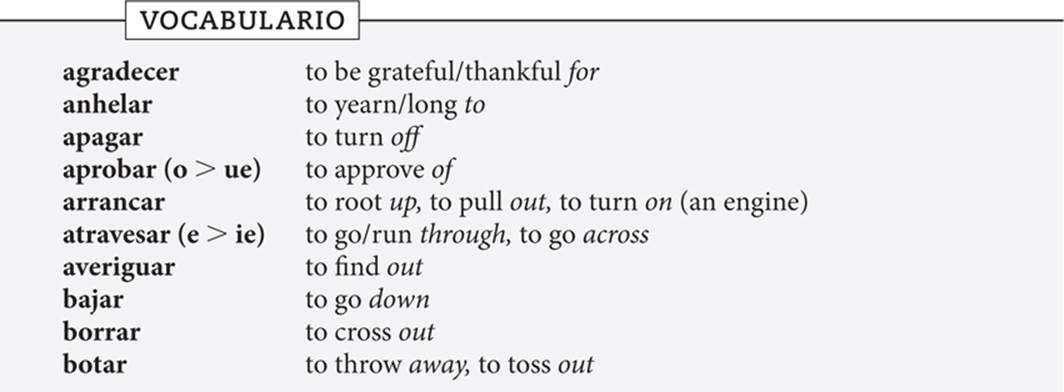
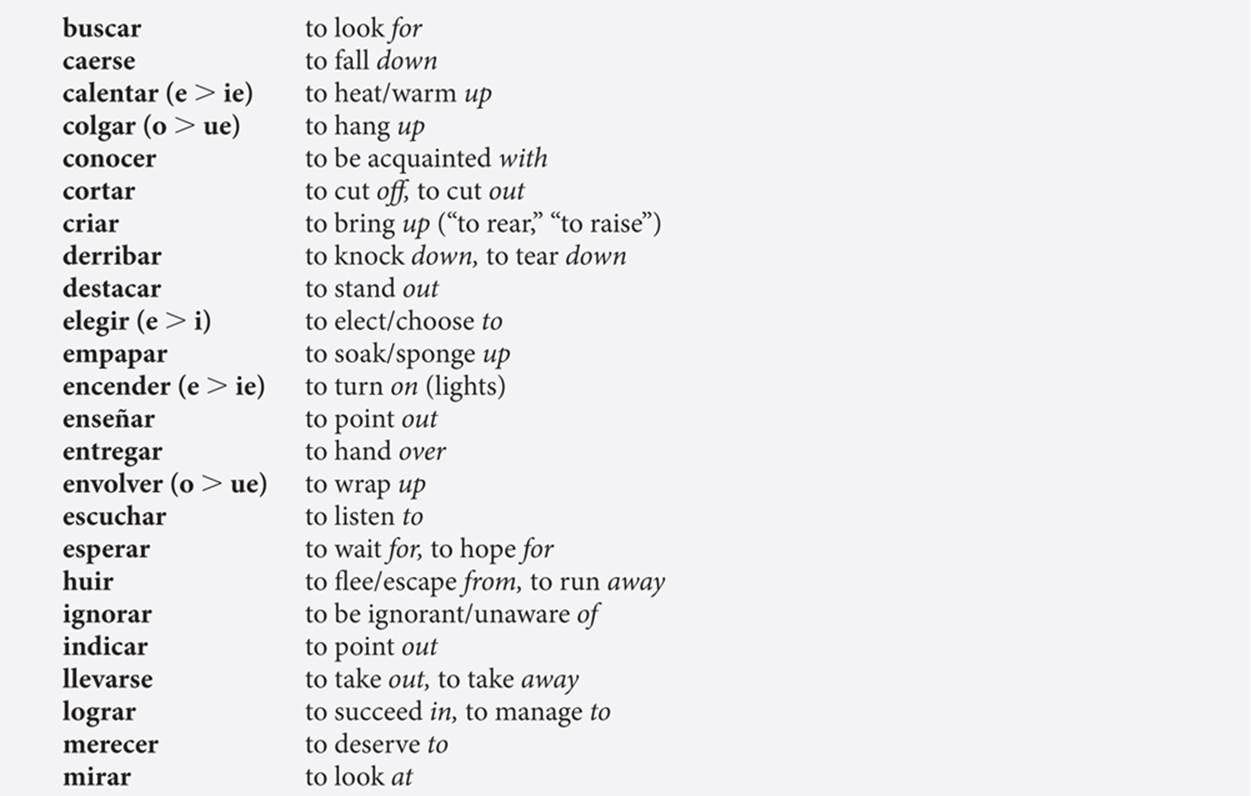
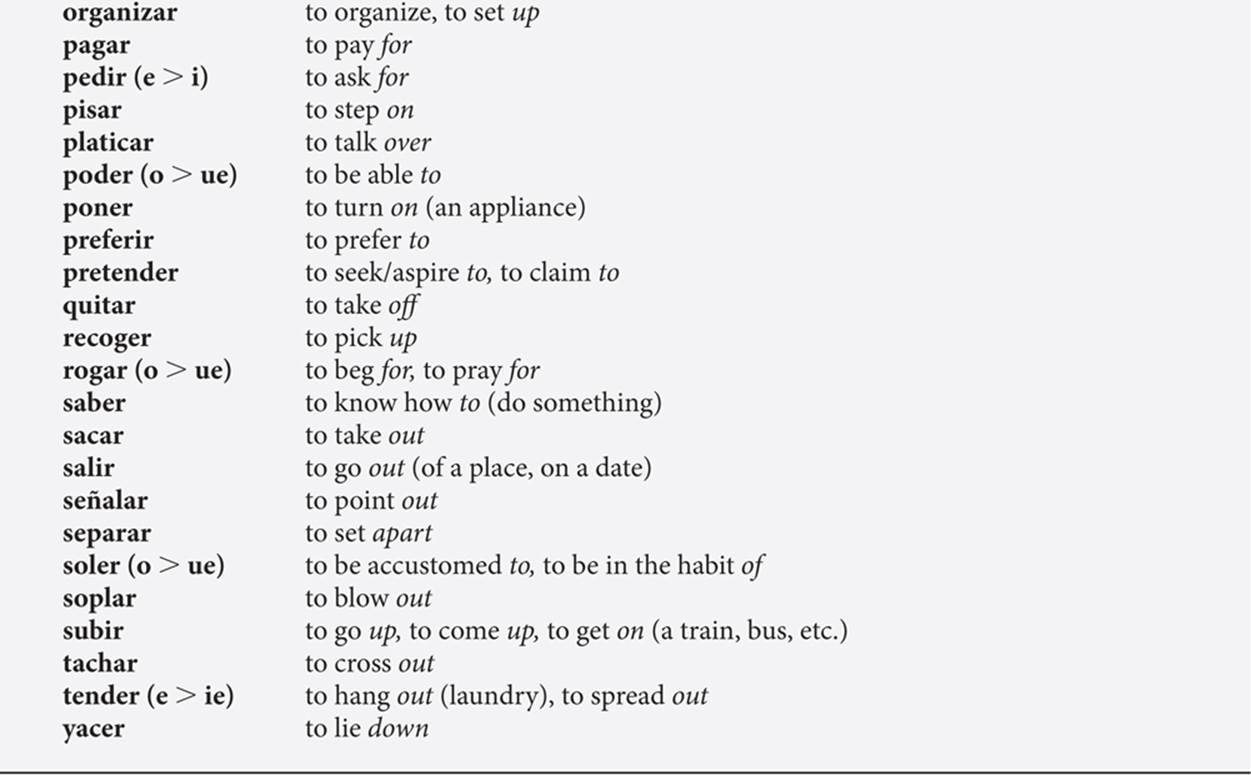
NOTE Some of these verbs have additional definitions that do not include a preposition in English.

¿Verdadero o falso?
________ 1. Usualmente, yo como en un restaurante, pero a veces me llevo la comida.
________ 2. Antes de preparar la carne, siempre quito la grasa (fat).
________ 3. Vanna White señala las letras en el popular programa La Rueda de la Fortuna.
________ 4. Cada sábado por la noche yo salgo con otra estrella de cine.
________ 5. El trabajo del detective con frecuencia es averiguar quién es el asesino (murderer).
________ 6. El gallo atraviesa la calle para llegar al otro lado.
________ 7. Me encanta soplar las velitas (candles) en la torta (cake) de cumpleaños.
________ 8. Cada día quito el polvo (dust) en mi casa o apartamento.
________ 9. Yo sé bailar el merengue.
________ 10. Yo merezco ganar la lotería.
________ 11. Cuelgo el teléfono cuando me llama un vendedor a quien no conozco.
________ 12. Las personas que vuelan en primera clase suben antes que los pasajeros en la clase turista.
________ 13. Siempre pongo la radio cuando conduzco (drive) largas distancias.
________ 14. Yo suelo estudiar por la noche y trabajar por el día.
________ 15. Apago las luces cuando miro la televisión.
________ 16. Mozart destaca por su música.

Traducción Translate the following sentences into Spanish, using the list of verbs on pages 149–150.
1. I am grateful for everything.
_______________________________________________________
2. What are you looking for? I’m looking for my glasses (los anteojos).
_______________________________________________________
3. Where should we hang up our coats (el abrigo)?
_______________________________________________________
4. I like to listen to classical music (la música clásica).
_______________________________________________________
5. You can turn off the lights because we’re going to bed now.
_______________________________________________________
6. The babysitter (la niñera) picks up the toys (el juguete).
_______________________________________________________
7. He crosses out all his mistakes (el error).
_______________________________________________________
8. Tonight Carlota is going to go out with Guillermo. She is very excited (ilusionado).
_______________________________________________________
9. I always take out the garbage (la basura). You should take out the garbage once in a while (de vez en cuando).
_______________________________________________________
10. The lawyer hands over the evidence (la evidencia) to the judge (el juez).
_______________________________________________________
11. The rags (el trapo) soak up the oil (el aceite).
_______________________________________________________
12. The mail carrier (el cartero) always steps on my roses.
_______________________________________________________
13. I need more money. I’m going to ask for a raise (el aumento) tomorrow.
_______________________________________________________
14. How long (¿Por cuánto tiempo?) do we have to wait for the bus?
_______________________________________________________
15. You can turn on the lights here and turn off the lights over there (allá).
_______________________________________________________
Verbs that follow prepositions
When a verb immediately follows a preposition, it always remains in the infinitive form. There is no exception to this rule. Usually the English translation of the infinitive will be in the gerund, or “-ing” form. However, at times the verb may translate as the infinitive in English as well.


¿Verdadero o falso?
________ 1. Además de tocar la guitarra, Bruce Springsteen también canta.
________ 2. Antes de comprar un libro, normalmente leo uno o dos capítulos en la librería.
________ 3. A veces, en vez de cepillarme los dientes, mastico chicle.
________ 4. Después de ganar las elecciones, el nuevo presidente siempre cumple (keeps) las promesas.
________ 5. Además de tomar esta clase de español, tomo por lo menos (at least) dos clases adicionales.
________ 6. Para mantener bien un coche, se necesita cambiar el aceite cada tres meses.
________ 7. Después de ganar la Serie Mundial, los jugadores van directamente a Disney World.
________ 8. Pienso en comprar un coche nuevo.
________ 9. Normalmente me ducho antes de acostarme.
________ 10. Pienso en renunciar a (quitting) mi trabajo.
________ 11. Para estar a la moda, es necesario gastar (spend) muchísimo dinero por la ropa.
________ 12. Este año, en lugar de cortar (mow) el césped (lawn), voy a comprar una cabra (goat).

Traducción
1. We’re going to drive to Vermont instead of flying.
_______________________________________________________
2. Before buying the eggs, you should look inside the carton (el cartón).
_______________________________________________________
3. I always feel better after exercising (hacer ejercicio).
_______________________________________________________
4. Besides being able to fly, Superman can see through (a través de) walls (la pared).
_______________________________________________________
5. I’m thinking about writing a novel.
_______________________________________________________
6. In order to get (llegar) to the bank, you should turn (doblar) right on Park Avenue.
_______________________________________________________
7. Do you want to swim instead of playing golf?
_______________________________________________________
8. She always eats a protein bar (la barra de proteína) after swimming.
_______________________________________________________
9. What do you have to do before leaving?
_______________________________________________________
10. I’m going to a lecture (la conferencia) about using computers.
_______________________________________________________
11. In addition to boiling (hervir) water, this stove (la estufa) can boil milk!
_______________________________________________________
12. John has to take three more (otras tres) classes in order to graduate (graduarse).
_______________________________________________________
Verbs that require a preposition
Many Spanish verbs require a preposition before the following word for a specific usage. That word is typically a noun or the infinitive form of another verb. For the most part, these verbs and their respective prepositions must be learned as one would learn other vocabulary words.
Below are several of these verbs, grouped by preposition and arranged alphabetically within groups. Following each VERB + PREPOSITION is the abbreviation for the part of speech that usually follows the verb in this usage, the verb’s English equivalent, and an indicator of the usage itself. For example, the entry “cuidar a (n.), to take care of (someone)” could be illustrated by this example: Yo cuido a Juan (“I take care of Juan”). The entry, “acabar de(v.), to have just (done something),” gives you enough information to write María acaba de escribir una carta (“María has just written a letter”).
NOTE In the entries for verbs listed under a, remember that the a following these verbs is a preposition. Be careful not to confuse the preposition a with the personal a (which is placed after verbs when the stated direct object is a person).
Abbreviations include (v.) for verb and (n.) for noun.
a
Verbs that are followed by a are often referred to as “springboard verbs” because they mark the beginning of an action. As you look through the following list of verbs, you will find that many of them move toward an action or lead a person ahead, either literally or figuratively.
Remember that the preposition a means “to,” and that when you go to something, you are moving ahead, going forward.

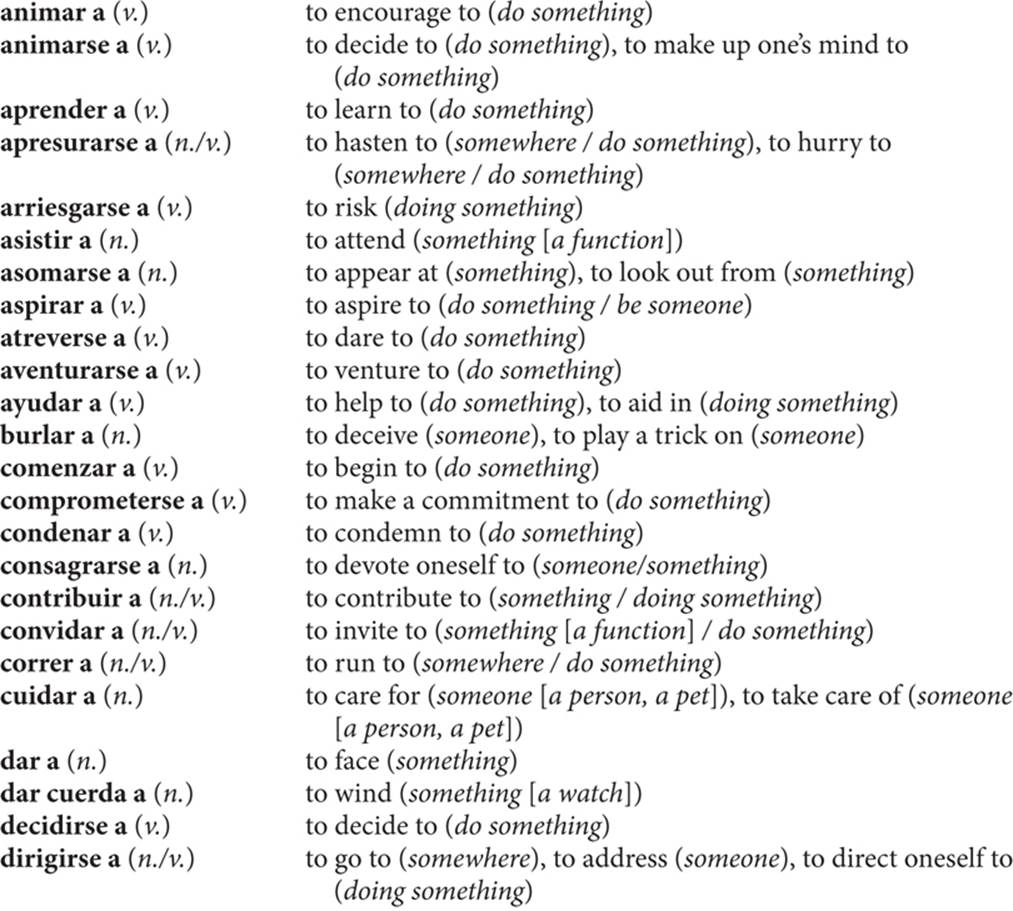
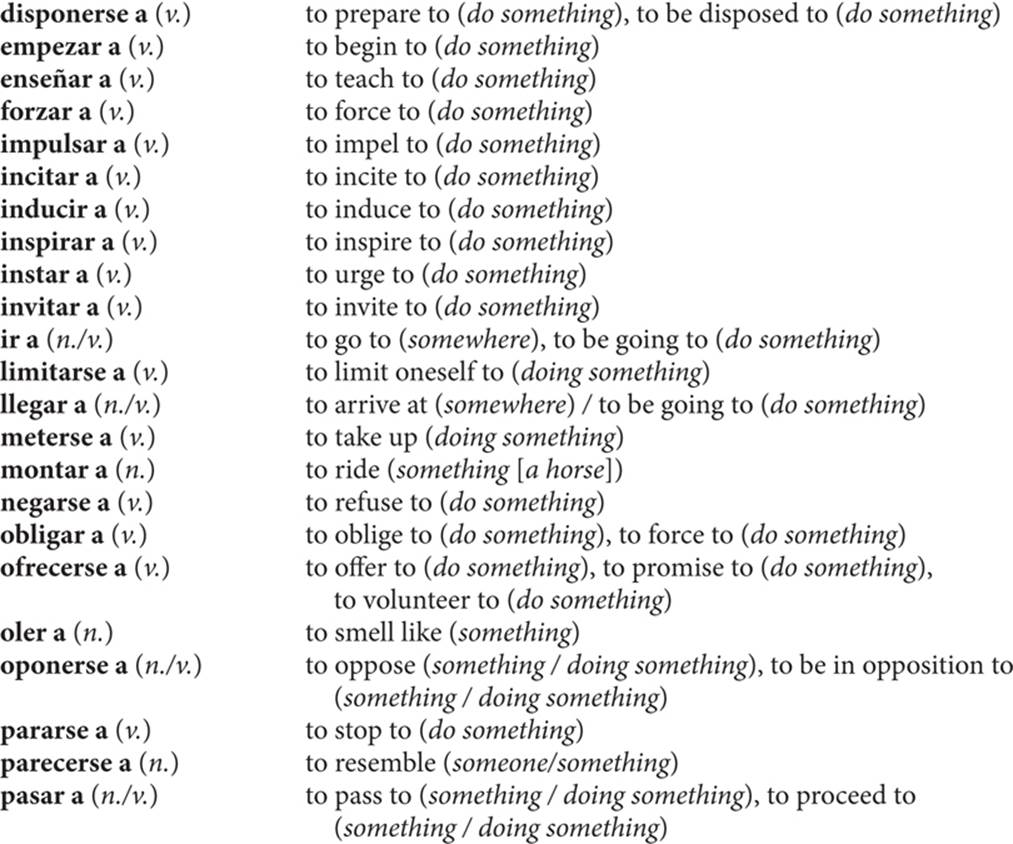
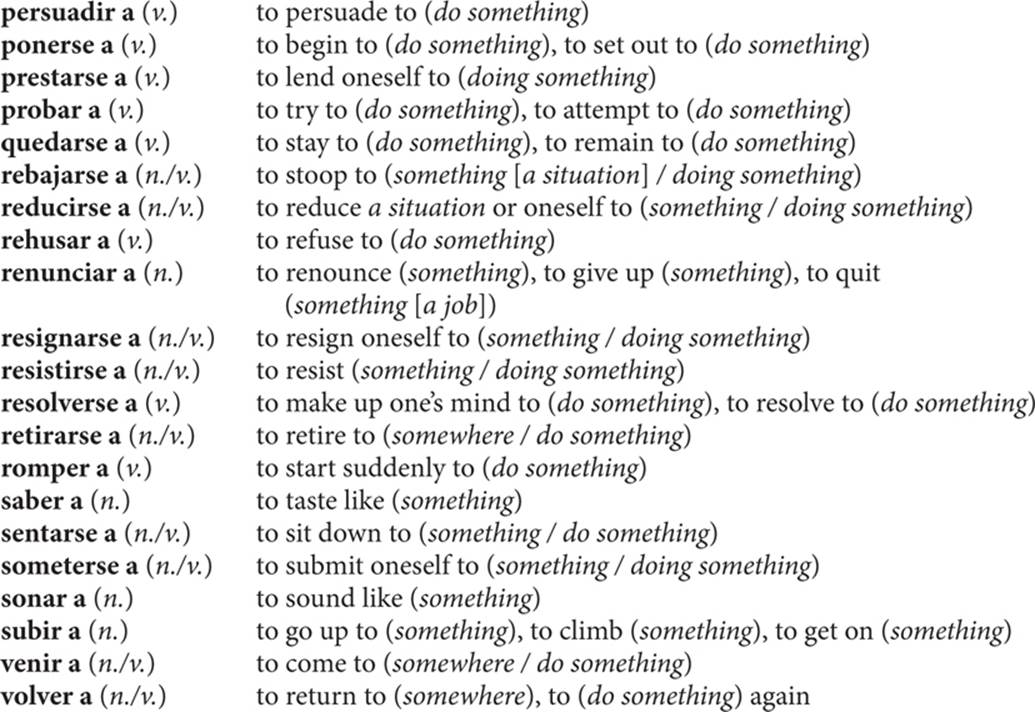

¿Verdadero o falso?
________ 1. Doy cuerda a mi reloj cada día.
________ 2. Me niego a volar cuando está lloviendo.
________ 3. Yo creo que el pavo sabe a pollo.
________ 4. Nadie puede forzarme a hacer nada.
________ 5. Siempre rompo a llorar en una boda.
________ 6. Quiero renunciar a mi trabajo.
________ 7. Después de sentarme a comer, rehúso a contestar el teléfono.
________ 8. Nunca me rebajo a robar dulces de un niño.
________ 9. Nadie puede persuadirme a comer una carpa dorada (goldfish), ni por un millón de dólares.
________ 10. Me parezco a uno de mis primos.
________ 11. Peter Jennings se parece a James Bond.
________ 12. A veces el ronroneo (purring) de un gato suena a un barco de motor.
________ 13. La memoria de la madre Teresa me inspira a ser una mejor persona.
________ 14. Mi casa da al este.
________ 15. Cuando subo a mi coche, me pongo el cinturón de seguridad inmediatamente.

Traducción Translate the following sentences into Spanish, using the preceding list of verbs that require a.
1. This sounds like a lie to me.
_______________________________________________________
2. She bursts out crying (llorar) every time she remembers the pain (el dolor) of her childhood (la niñez).
_______________________________________________________
3. He’s going to quit his job, because his company (la compañía) is going to begin to downsize (recortar el personal).
_______________________________________________________
4. Sooner or later (tarde o temprano), you have to resign yourself to the fact (el hecho de) that some people are not honest (honrado).
_______________________________________________________
5. You can’t force us to do anything that we don’t want to do.
_______________________________________________________
6. Benjamín winds his watch every day at nine o’clock in the morning.
_______________________________________________________
7. Mrs. Dalí encourages her children to study the fine arts (las bellas artes).
_______________________________________________________
8. In this house, we sit down to eat dinner (cenar) at seven o’clock sharp (en punto).
_______________________________________________________
9. What time do we get on the train?
_______________________________________________________
10. This frog tastes like a toad (el sapo).
_______________________________________________________
11. Mateo says that snake meat (la carne de culebra) tastes like chicken.
_______________________________________________________
12. Oscar Wilde says that he can resist everything but (salvo) temptation (la tentación).
_______________________________________________________
13. In this section of the book, we learn how to use verbs that take (tomar) the preposition a.
_______________________________________________________
14. Some athletes (el atleta) become used to receiving and spending (gastar) lots of money.
_______________________________________________________
15. Richard is not disposed to giving us anything today. He is not in the mood (de humor).
_______________________________________________________
con
Verbs that require the preposition con sometimes clearly have the meaning “with,” as in asociarse con, which means “to associate with.” For other verbs, it takes deciphering the real meaning of the verb to understand more clearly why it takes con.
For example, the verb casarse con, which means “to marry,” has as its root the noun la casa (“house”). The verb casarse con actually means “to set up a house for oneself with (someone).” Another frequently used verb, encontrarse con (“to run into,” “to meet up with”), means literally, “to find oneself with.”
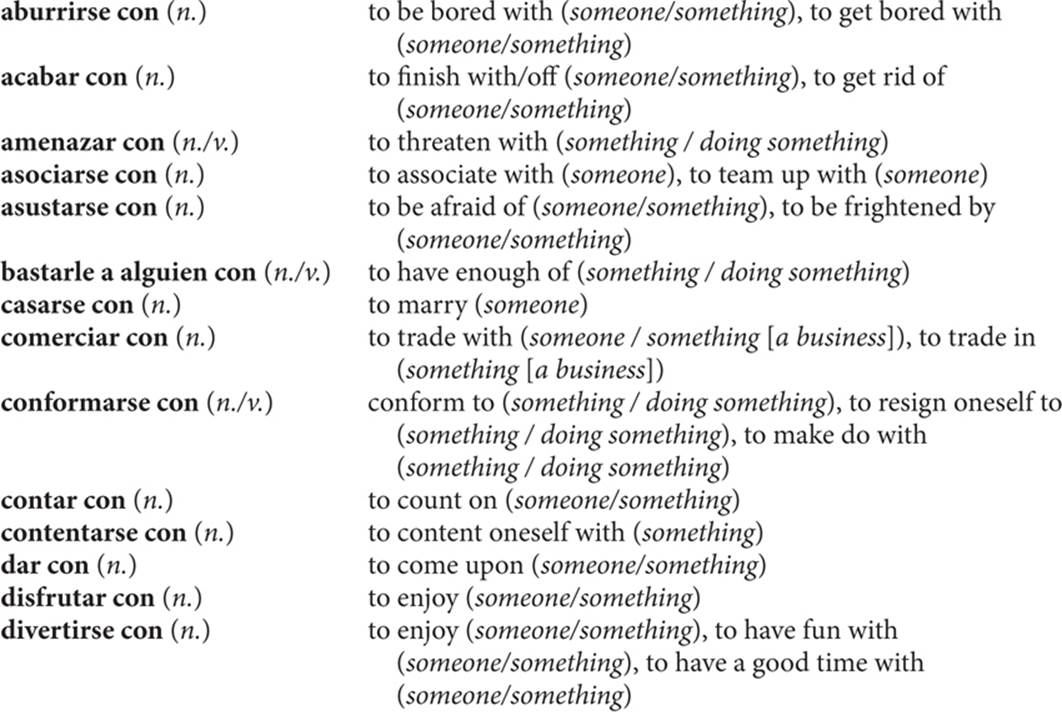
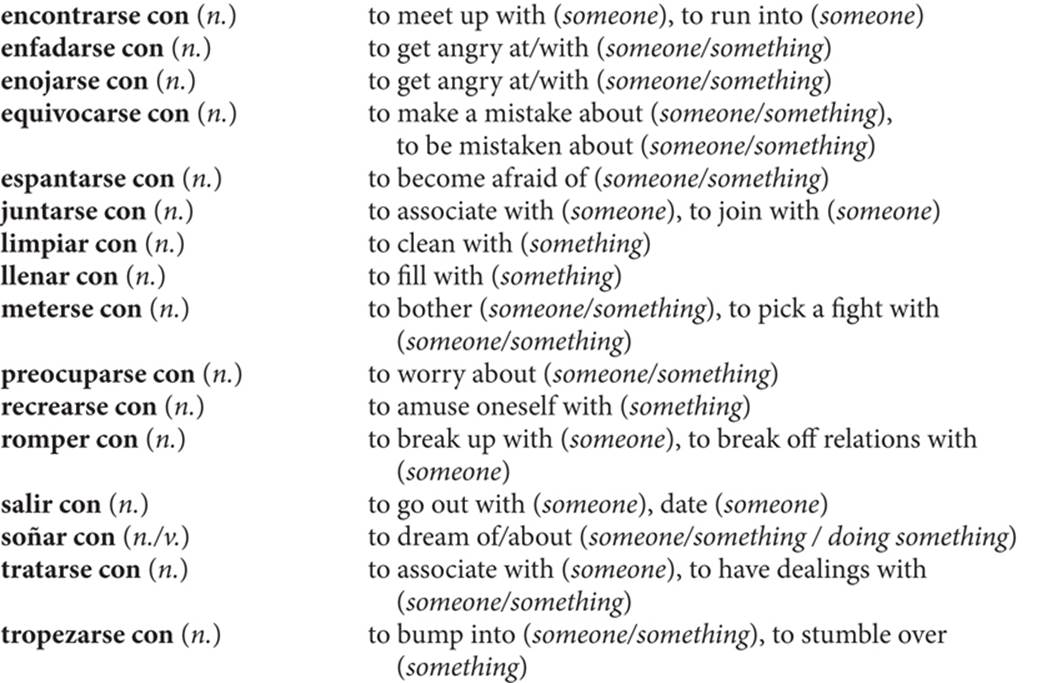

¿Verdadero o falso?
________ 1. A veces me encuentro con amigos para tomar un café.
________ 2. Disfruto mucho con los discos de Lady Gaga.
________ 3. Un día quiero casarme con alguien de Hollywood.
________ 4. Me enojo con personas que no me dicen la verdad.
________ 5. Cuando una persona me miente, generalmente rompo con él o con ella.
________ 6. Por las mañanas me basta con tomar café.
________ 7. Sueño con ser una estrella de cine algún día.
________ 8. Siempre puedo contar con mi mejor amigo/amiga.
________ 9. Me junto con muchos músicos.
________ 10. No me asocio con vendedores de drogas ni de pistolas.
________ 11. Me aburro con la mayoría de los programas en la televisión.
________ 12. Cuando no hay luces, a veces me tropiezo con el sofá.
________ 13. Cuando estoy enojado/enojada, amenazo con matar a alguien.
________ 14. Muchas compañías de los Estados Unidos comercian con Japón.
________ 15. Siempre me conformo con pagar los impuestos sin quejarme.

Traducción Translate the following sentences into Spanish, using the preceding list of verbs that require con.
1. You can count on me, but can I count on you?
_______________________________________________________
2. Every Wednesday, I meet up with Kay (in order) to eat dinner (cenar) and to converse.
_______________________________________________________
3. In the movie Spiderman, Peter Parker (Spiderman) dates Mary Jane Watson.
_______________________________________________________
4. I become afraid of the dark (la oscuridad) during a storm (la tormenta).
_______________________________________________________
5. It’s tragic, but sometimes (a veces) a person needs to break off relations with his/her family.
_______________________________________________________
6. The egomaniac (el egoísta) dreams of being famous, popular, and rich.
_______________________________________________________
7. I don’t associate with companies that sell tobacco (el tabaco).
_______________________________________________________
8. Now and then (de vez en cuando) I am mistaken about people (la persona).
_______________________________________________________
9. We always have a good time with our neighbors (el vecino).
_______________________________________________________
10. She gets angry at me when I am late (llegar tarde).
_______________________________________________________
11. Donna has no dealings with her husband’s family because they are horrible people.
_______________________________________________________
12. If you clean the bathtub (la bañera) with Brillo, you’re going to damage (dañar) it.
_______________________________________________________
13. Now and then I come upon someone who truly (verdaderamente) inspires (inspirar) me.
_______________________________________________________
14. If Juan isn’t careful (no tener cuidado), he’s going to bump into the wall.
_______________________________________________________
15. On Sunday mornings, I often content myself with orange juice and the newspaper.
_______________________________________________________
de
Verbs that are followed by de are often verbs of cessation or withdrawal. This is seen clearly in terminar de + VERB, which means “to finish (doing something).” The concept of something ending is seen frequently in an examination of the list of verbs below.
The preposition de also follows many verbs of emotion. Aburrirse de (“to be bored by/with”), cansarse de (“to be/get tired of”), sorprenderse de (“to be surprised at”) are a few examples of verbs of emotion that take de.

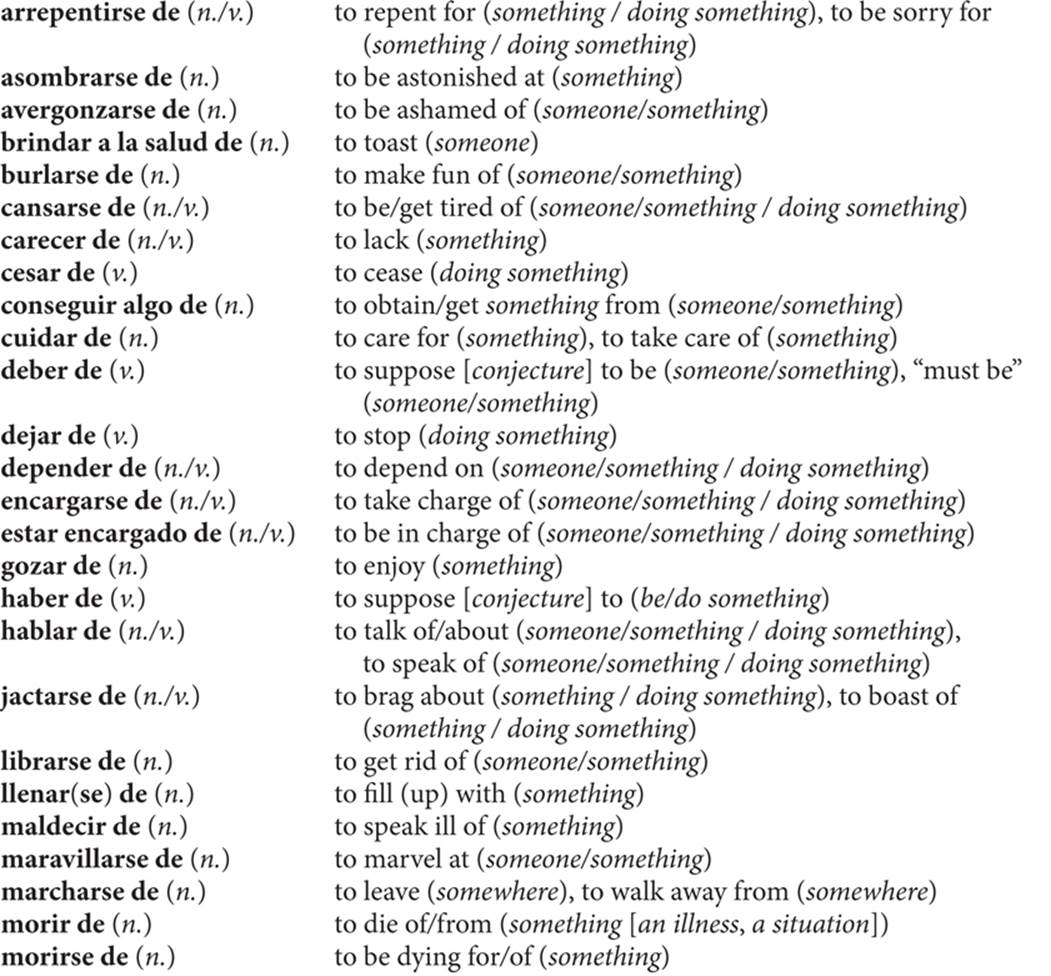
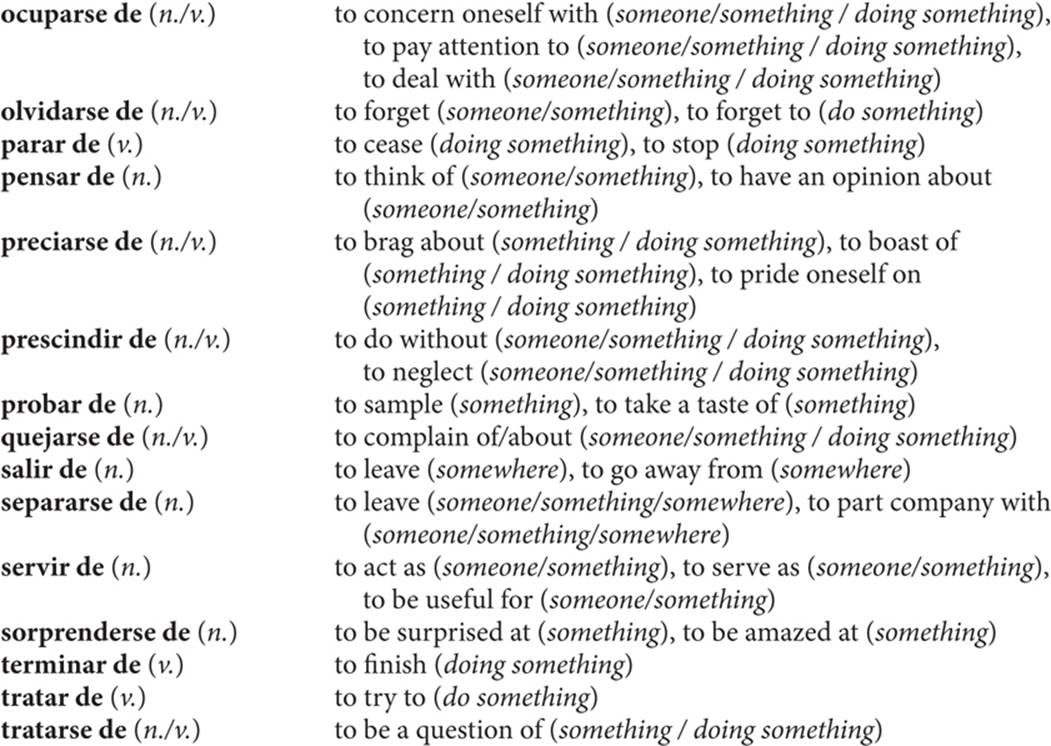

¿Verdadero o falso?
________ 1. Acabo de comer una hamburguesa.
________ 2. Usualmente, me alegro de tomar un examen.
________ 3. Cada primavera me libro de muchas cosas que ya no necesito en mi casa.
________ 4. Gozo mucho del teatro.
________ 5. En mi casa estoy encargado/encargada de sacar la basura.
________ 6. Parte de mi decisión de ir de vacaciones depende de la cantidad de dinero que tengo en el banco.
________ 7. Me aburro mucho de las personas que no piensan antes de hablar.
________ 8. Cada día trato de ser una persona honrada (honest).
________ 9. Típicamente salgo de mi casa entre las siete y las nueve de la mañana.
________ 10. Normalmente no me acuerdo de pagar las cuentas (bills) cada mes.
________ 11. La fruta puede servir de ensalada o de postre.
________ 12. A veces me olvido del nombre de una persona a quien acabo de conocer.
________ 13. Cada año miles de personas mueren de cáncer de pulmón (lung).
________ 14. Si no desayuno, para las once de la mañana me muero de hambre.
________ 15. Muchas personas se quejan de pagar los impuestos cada 15 de abril.

Traducción Translate the following sentences into Spanish, using the preceding list of verbs that require de.
1. He always forgets to take his medicine.
_______________________________________________________
2. This sofa serves as a comfortable (cómodo) bed.
_______________________________________________________
3. We have to finish cleaning the house by four thirty.
_______________________________________________________
4. Every day I get rid of at least (por lo menos) five things because I don’t like clutter (el desorden).
_______________________________________________________
5. She always complains about working so much (tanto).
_______________________________________________________
6. I marvel at people who can dance well.
_______________________________________________________
7. I’m in charge of cooking, and you’re in charge of serving the meals.
_______________________________________________________
8. I often forget a person’s name, but I never forget the face.
_______________________________________________________
9. You should get away from dangerous people.
_______________________________________________________
10. I have just read a wonderful article (el artículo) in the newspaper.
_______________________________________________________
11. Don’t we have orange juice? I’m dying of thirst (la sed).
_______________________________________________________
12. Who’s going to take care of your house next week?
_______________________________________________________
13. They’re talking about moving (mudarse) to Troy, New York next year.
_______________________________________________________
14. I don’t like to be with him because he always speaks ill (mal) of other people.
_______________________________________________________
15. There are people who take advantage of others without remorse (remordimiento). They are called social predators (depredadores sociales).
_______________________________________________________
en
When a Spanish verb takes the preposition en, that en will often translate as English “in” or “on.” For example, confiar en means “to confide in, trust”; insistir en means “to insist on.”
One of the more frequently used verbs in this category is pensar en, which usually means to think about”; however, some English speakers use the expression “to think on.” Although some verbs in this category are idiomatic in their translation, many demonstrate the use of “in” or “on.” Familiarize yourself with them, and use them until you feel comfortable.
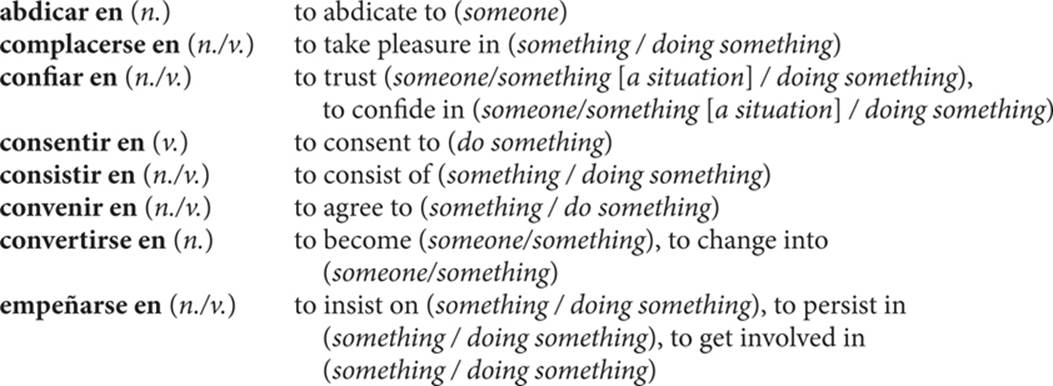
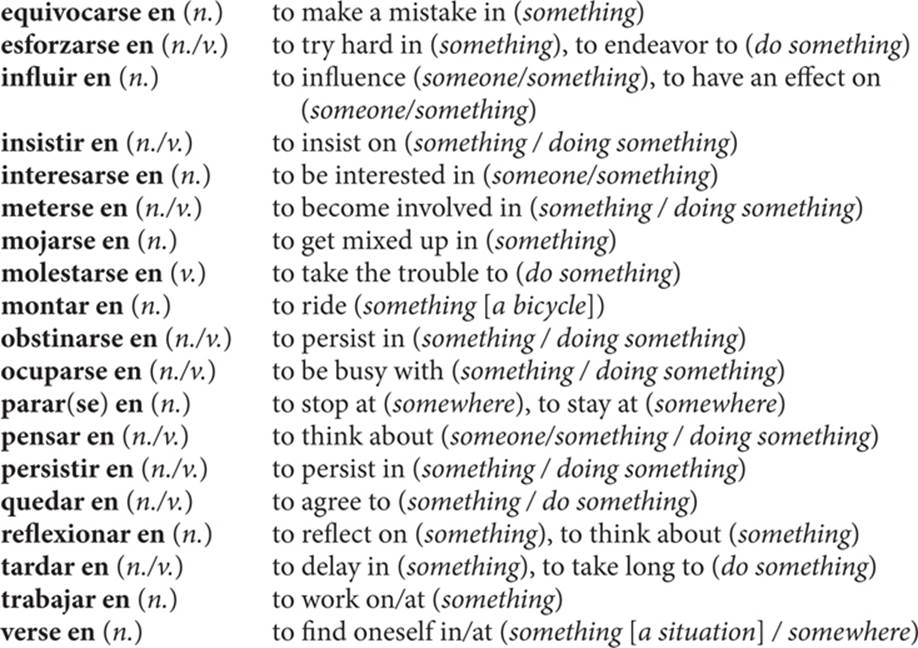

¿Verdadero o falso?
________ 1. No me gusta meterme en los problemas de los demás.
________ 2. Los huevos rancheros consiste en huevos y rancheros.
________ 3. Yo confío en mi mejor amigo/amiga.
________ 4. En el cuento “Cenicienta,” los ratones se convierten en caballos.
________ 5. La memoria de la madre Teresa influye en muchas personas por el mundo.
________ 6. Tardo más de veinte minutos en ir de mi casa al aeropuerto.
________ 7. Es descortés persistir en discutir algo que la otra persona no quiere discutir.
________ 8. Pienso mucho en el significado de la vida.
________ 9. Siempre pienso en el bienestar (well-being) de otras personas.
________ 10. Todos los sábados me paro en una gasolinera para comprar chicle y revistas.
________ 11. Siempre me empeño en leer un contrato palabra por palabra antes de firmarlo.
________ 12. Es peligroso montar en un coche con una persona que está borracha (drunk).
________ 13. Las personas obsesionadas con el control siempre insisten en tener la última palabra.
________ 14. Tengo que confesarlo: Me esfuerzo en aprender cocinar, pero es muy difícil.
________ 15. Nunca quedo en hacer algo que es peligroso.

Traducción Translate the following sentences into Spanish, using the preceding list of verbs that require en.
1. Some people persist in exercising (hacer ejercicio) even (aun) when they’re sick.
_______________________________________________________
2. María takes pleasure in playing the guitar at parties.
_______________________________________________________
3. First I think about food, and then I think about eating something.
_______________________________________________________
4. Every day we should reflect on something good in (de) this world.
_______________________________________________________
5. At the end (A finales) of the month, Marcos always finds himself in a jam (el apuro).
_______________________________________________________
6. When the police arrive, the thief consents to go with them peacefully (pacíficamente).
_______________________________________________________
7. People who gossip (chismear) involve themselves in other people’s lives.
_______________________________________________________
8. Juan and María agree to consult a psychiatrist (el psiquiatra).
_______________________________________________________
9. Every year I agree to contribute (donar) to the Cancer Society.
_______________________________________________________
10. You shouldn’t get involved in their problems.
_______________________________________________________
11. I’m not thinking about anything now.
_______________________________________________________
12. My sister never takes the trouble to telephone (me) (llamar por teléfono).
_______________________________________________________
13. I am very interested in international politics (la política internacional).
_______________________________________________________
14. It takes me one hour to drive to the stadium (el estadio) from here.
_______________________________________________________
15. For exercise, the children ride bicycles.
_______________________________________________________
para
The smallest group of verbs that take a preposition consists of the verbs that take para. The preposition para often implies moving ahead or toward something. The following verbs indicate that an action is occurring for the purpose of something else to happen—something moves ahead, precipitating something else.


¿Verdadero o falso?
________ 1. Trabajo para una persona muy simpática y honrada.
________ 2. Cuando me siento para comer, generalmente tengo conmigo un periódico o una revista.
________ 3. Para mí, la televisión no sirve para nada.
________ 4. Estoy listo/lista para tomar el examen final en esta clase de español.
________ 5. Cada mañana me preparo para el trabajo.
________ 6. Un diccionario de español sirve para enseñar el idioma.
________ 7. Cuando estoy para dormir, enciendo todas las luces en la casa.
________ 8. Cada día trabajo para mejorarme y entender más del mundo.
________ 9. Un buen negociante se queda en la oficina para terminar el trabajo cada noche.
________ 10. Cuando me preparo para acostarme, siempre me cepillo los dientes.
________ 11. El anillo de matrimonio sirve para simbolizar el compromiso (commitment).
________ 12. Un contable (accountant) trabaja para ahorrar (to save) dinero para su cliente.

Traducción Translate the following sentences into Spanish, using the preceding list of verbs that require para.
1. Usually it’s very late when I sit down to study.
_______________________________________________________
2. Martha Stewart says that many things in the garbage can (la basura) serve as decorations in the house.
_______________________________________________________
3. Are you ready to leave? Yes, we’re ready to leave.
_______________________________________________________
4. We’re about to eat lunch (almorzar).
_______________________________________________________
5. I want to work for another company.
_______________________________________________________
6. Do you want to stay to watch the news (las noticias) with me?
_______________________________________________________
7. This film is of no use.
_______________________________________________________
8. Every January, many people strive to lose weight (perder peso).
_______________________________________________________
9. Kate needs at least (por lo menos) two hours in order to prepare herself for each public appearance (la aparición pública).
_______________________________________________________
10. Bjorn is preparing himself to find a new job, because he works for a real brute (el bruto).
_______________________________________________________
por
Verbs that take por often deal with emotions (for example, llorar por) or convey a feeling of equality in the sense of “on behalf of” (for example, abogar por).
The difference between para (purpose and destination) and por (emotions and equality) is seen in the verb pairs estar para (“to be about to” do something) and estar por (“to be in favor of” doing something), as well as trabajar para (“to work for” someone) and trabajar por (“to work in place of” or “to work on behalf of” someone).
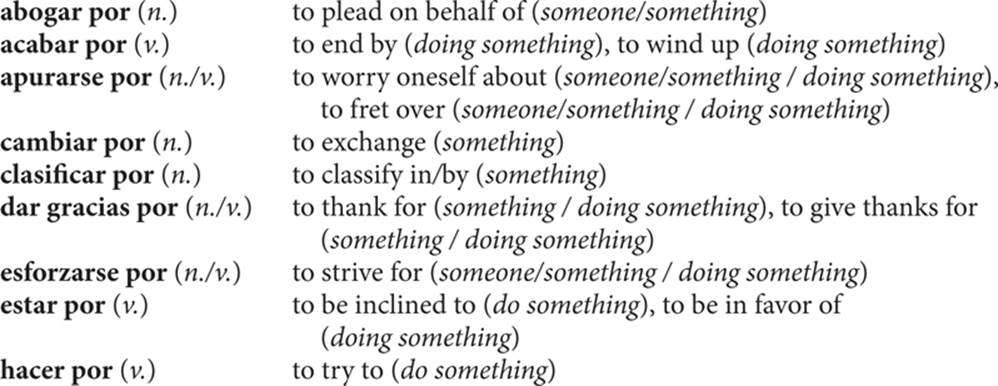
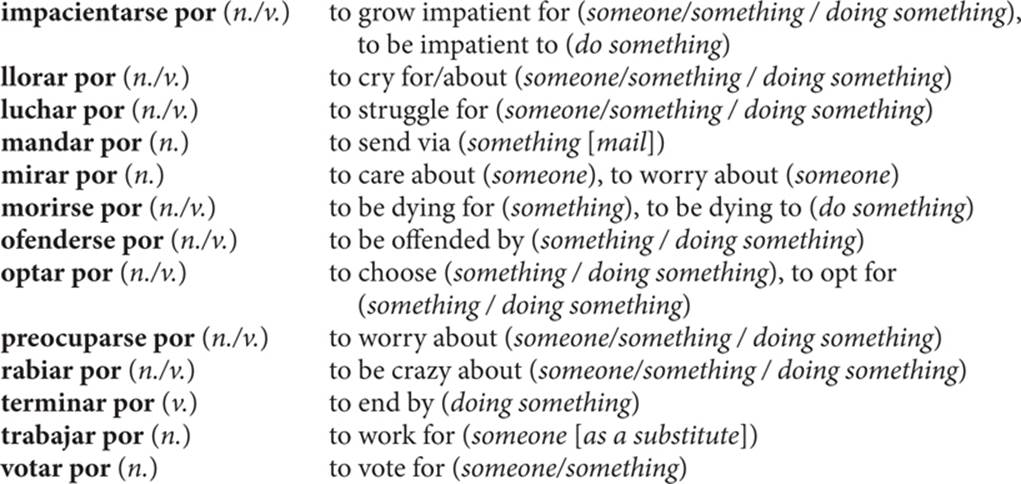

¿Verdadero o falso?
________ 1. Me preocupo mucho por el dinero.
________ 2. Cuando tengo que decidir entre la televisión o el teatro, usualmente opto por el teatro.
________ 3. Cherie Booth, Gloria Allred y Nancy Grace abogan por sus clientes.
________ 4. Las personas de Argentina lloran por Evita Perón.
________ 5. En las elecciones políticas, siempre voto por el candidato más moderado.
________ 6. Romeo rabia por Julieta.
________ 7. Puedo comprar más si cambio mis dólares por pesos.
________ 8. Durante los fines de semana, estoy por dormir mucho y trabajar poco.
________ 9. A veces doy gracias por las dificultades de la vida.
________ 10. Cuando un maestro está enfermo, típicamente un sustituto trabaja por él.
________ 11. Con frecuencia la orquesta termina por tocar algo excepcional.
________ 12. Si no tengo planes específicos para el fin de semana, usualmente acabo por no hacer nada.
________ 13. Me esfuerzo por hacer lo mejor que pueda todos los días.
________ 14. Me impaciento por personas que conducen muy lentamente.
________ 15. Durante el año, mando muchos regalos por correo.

Traducción Translate the following sentences into Spanish, using the preceding list of verbs that require por.
1. Harold worries about losing his teeth and his hair.
_______________________________________________________
2. In the novel Anna Karenina, Levin struggles always to do the right thing (lo correcto).
_______________________________________________________
3. The people (el pueblo) of Argentina shouldn’t cry for Evita.
_______________________________________________________
4. I worry a lot about you.
_______________________________________________________
5. Many people are offended by the waste (el desperdicio) of food in restaurants.
_______________________________________________________
6. I’m dying to see your new hairdo (el peinado).
_______________________________________________________
7. In this office, we classify everything by size (el tamaño).
_______________________________________________________
8. Usually a gymnast (el gimnasta) ends by doing something spectacular (espectacular).
_______________________________________________________
9. They always opt for swimming in the river.
_______________________________________________________
10. When I have a choice (la elección) between two movies, I usually opt for the one that has the better reviews (la reseña).
_______________________________________________________
11. Laura is impatient to move (mudarse) to another part of the country.
_______________________________________________________
12. Many defense lawyers (el abogado defensor) plead on behalf of a guilty (culpable) person.
_______________________________________________________
13. We give you thanks for telling us the truth.
_______________________________________________________
14. I always classify my books alphabetically (orden alfabético).
_______________________________________________________
15. She always votes for the less attractive candidate.
_______________________________________________________